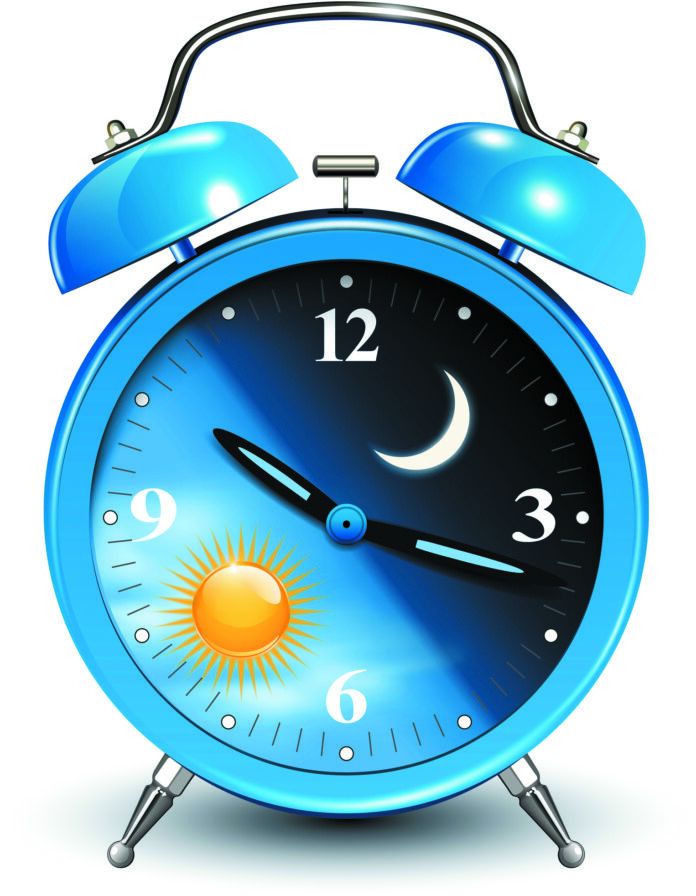You probably know the saying, “you are what you eat,” but, according to the latest research, you may also be when you eat. “Your metabolism is different at different times of the day,” says José M. Ordovás, PhD, lead scientist on the Nutrition and Genomics team at the HNRCA and a professor at the Friedman School, “and the interaction between food intake and these natural, rhythmic biological changes can impact the way your body functions.” Scientists are learning more about how you can capitalize on this concept of chrononutrition to improve your health.
Your Body Clock. Each of us has a biological clock. “The master clock is in the brain, but there are peripheral clocks in every organ of the body,” says Ordovás. These rhythms control physical activity patterns, endocrine functions, and things like blood pressure, body temperature, and alertness in a roughly 24-hour cycle. Genetics and age influence your internal clock, and it can be reset by changes in eating/fasting habits, light/darkness exposure, and sleep/wake cycles. “Sleep is very important,” says Ordovás, “and we are surrounded by disrupters that cause what we call social jetlag.” Shift work, a busy nightlife, pandemic restrictions, and even variations in sleep patterns between weeknights and weekends can alter your body’s internal (circadian) rhythms.
“Chrononutrition is implanted in our development from the very moment we are born,” says Ordovás. “The composition of breastmilk changes throughout the day to give the baby what it needs. At some times of day there is more melatonin in the milk (to encourage sleep), for example. At other times there are more fats to provide energy.” Beyond infancy, what you eat, the time of day you eat it, how frequent and regular your meals are, and when you start and stop consuming meals in a 24-hour day may all interact with your body’s natural rhythms in ways that affect your well-being.
Impact on Health. Our eating and sleeping patterns can classify us as morning, intermediate, or evening chronotypes. “Research suggests that, when our biological clocks aren’t synced with our environment and lifestyle, we may have increased risk for obesity, cardiovascular disease, poor glucose control, and type 2 diabetes,” says Ordovás.
Data from a study being conducted in Spain found a link between chronotype and cardiometabolic risk factors. The researchers measured activity, sleep habits, and timing of food intake of participants on either a Mediterranean-style or low fat dietary pattern. Participants who tended to wake up later and feel more active in the evening or night had less desirable cardiometabolic markers (higher blood levels of triglyceride, homocysteine, and inflammatory proteins and lower HDL cholesterol) than those who woke up earlier and tended to feel more active during the morning—regardless of their dietary intake.
While more research is needed, other studies have suggested people who eat their meals later in the day (lunch after three o’clock, for example) lose less weight than earlier eaters in the same weight loss program; eating within two and a half hours of bedtime results in impaired glucose tolerance (thereby increasing risk for type 2 diabetes); and sticking to a limited eating window (such as between 7 a.m. and 9 p.m.) can favorably impact cardiometabolic health. But how these factors impact your health is personal, as genetics has been found to play a significant role. “It is important to highlight that each of us is different when it comes to our chronobiology,” says Ordovás. “but if we can sync what and when we eat with our circadian rhythms, we might be healthier.”
What to Do. “There is strong evidence that when we eat is important,” says Ordovás. “Timing of meals can get the clock going in the right or wrong direction.” He recommends people who are typically night owls should try to modify their lifestyle by waking up, eating, and going to bed a little earlier. “These do not have to be dramatic changes,” Ordovás says. “It is possible that changes as small as 30 minutes may be helpful.”
Research findings, obtained in artificial settings, must be put in the context of real life. Your ability to go to bed a little earlier and wake up a little earlier depends on work, family, and other obligations. “Don’t compromise quality and quantity of sleep,” says Ordovás. Seven or eight hours a night is recommended. Remember that dramatic changes aren’t sustainable and are unlikely to work in long term.
“In the future,” says Ordovás, “we will have an even better understanding of chrononutrition, and we’ll have the genetic information we need to provide the best advice on meal timing, frequency, and composition to each individual.”
- Get your ZZZs. Aim to sleep 7 to 8 hours a night and keep your sleep/wake cycle as consistent as possible.
- Give a Hoot. If you’re a night owl, shift your waking, eating, and bedtimes a little earlier if your schedule allows.
- Close the Kitchen. Consider eating within a set period of time, such as between 7 a.m. and 9 p.m., and stop eating at least 2 hours before bedtime.
- See the Light. Get out into the sunlight during the day, and aim to keep it dim after dark. Know Yourself. Everyone’s chronobiology is different. Find what works for your body.
























